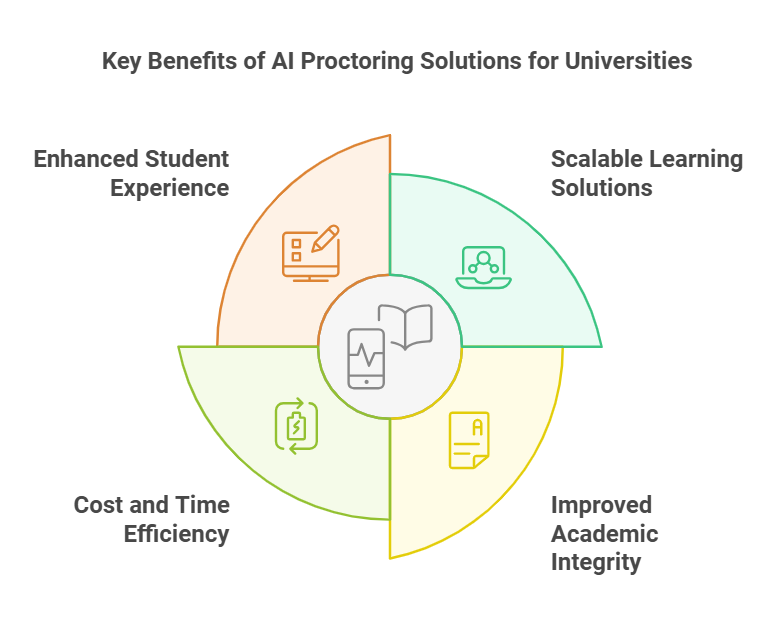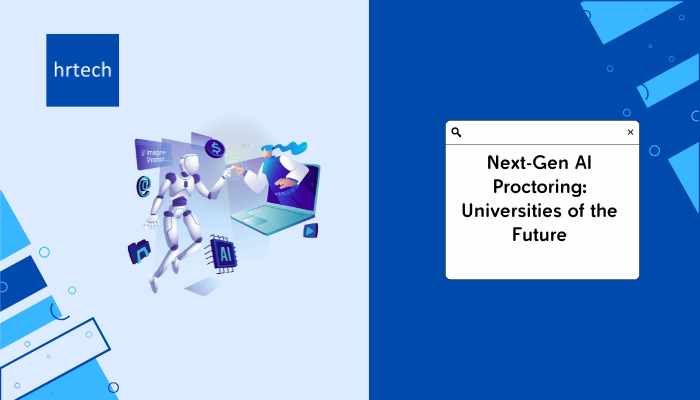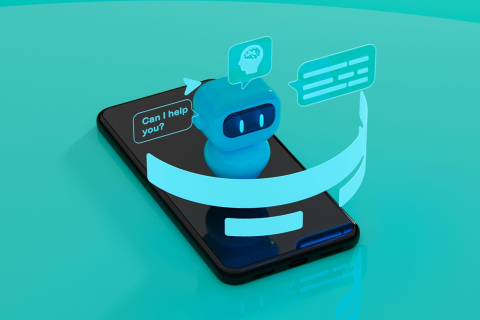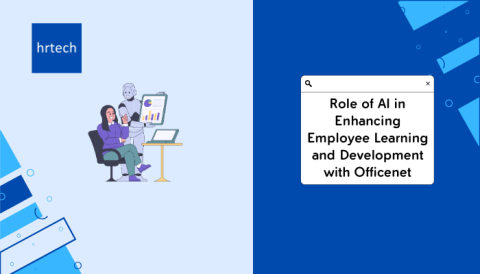The world of education is undergoing a massive transformation. With the accelerated shift to online learning and remote assessments, universities are finding themselves in a unique position where the traditional methods of proctoring exams are no longer adequate.
As higher education embraces digital platforms, there is a growing need for innovative solutions that can ensure secure, fair, and scalable assessments. One such solution is AI proctoring—an advanced technology rapidly changing how online exams are conducted and monitored.
In this blog, we’ll delve into why AI proctoring solutions are becoming a critical tool for universities, the benefits they offer, and how they can shape the future of assessments. If you’re a higher education administrator or involved in academic technology, understanding AI proctoring is essential to navigating the future of education.
Rise of Online Education and the Need for AI Proctoring Solutions
The digital transformation of education has brought numerous advantages. Remote learning has opened doors for students across the globe, making education more accessible and flexible. However, with these benefits come new challenges. One of the most pressing concerns is the integrity and security of online exams.
According to Business research insights, the global online exam proctoring market was valued at USD 0.47 billion in 2023 and is projected to grow to USD 1.91 billion by 2032, with a compound annual growth rate (CAGR) of 16.83% during the forecast period.
To understand why AI proctoring is a necessary solution, we must examine the limitations of traditional proctoring methods. Traditional proctoring methods, such as in-person invigilators and classroom-based assessments, are no longer feasible for large-scale online exams.
Universities are now tasked with maintaining academic integrity and ensuring fairness while scaling up their online learning initiatives. Cheating, unauthorized collaboration, and other forms of academic dishonesty have become more prevalent in digital assessments, undermining the credibility of online education.
For more insights on how technology transforms educational processes and hiring practices, you can also explore key talent acquisition and hiring trends that shape the future of digital workflows and skill-based assessments.
Why Are AI Proctoring Solutions Becoming Essential for Modern Education?
Before diving into the specifics of AI proctoring solutions, it’s important to understand the challenges of traditional exam proctoring methods. In the past, universities would rely on in-person invigilators to monitor students during exams. However, this approach is increasingly impractical with the rise of online learning and remote assessments.
Studies have indicated that while AI proctoring can detect a higher percentage of violations compared to human proctors, 35.61% vs. 25.95% in one study, it still requires improvements to match human judgment levels fully.
Let’s take a closer look at the limitations of human proctors and why they are no longer sufficient for today’s educational needs.
- Scalability Issues: In large online classrooms with thousands of students, having enough human proctors to monitor every student becomes impossible.
- Human Error: Even the best-trained human proctors can miss suspicious activity or fail to notice cheating behaviors, leading to unfair assessments.
- Limited Coverage: Human proctors are typically limited to observing students in person or through video, but they cannot effectively track other forms of cheating, such as unauthorized device usage or remote collaboration.
With these challenges in mind, it’s clear that universities need a more advanced solution that can handle online education’s complexities while ensuring fairness and security. This is where AI proctoring solutions provide a much-needed technological edge.
For example, AI tools in HR transform workflows, offering efficiency, personalization, and scalability benefits. To explore how AI is revolutionizing different industries, check out AI tools for HR.
To learn more about how AI is reshaping the future of education and helping universities meet the demands of a digitally native student body, download the full eBook Next-Gen AI Proctoring: Universities of the Future.
Technological Advancements in Proctoring
Recent advancements in proctoring technology have significantly transformed how exams are monitored, enhancing security and fairness. AI proctoring solutions are at the forefront of these changes, offering sophisticated capabilities to ensure integrity in online testing environments.
- Integration of Sophisticated Algorithms: Modern proctoring systems utilize advanced algorithms to enhance the accuracy and efficiency of monitoring, ensuring a more reliable assessment of test-takers behaviors and environments. These algorithms help detect irregularities, such as cheating attempts, by analyzing real-time patterns and inconsistencies.
- Incorporation of Machine Learning for Adaptive Proctoring: Machine learning technologies allow proctoring systems to adapt to different testing environments and individual behaviors. By continuously learning from previous sessions, these systems can better identify potential breaches, offering more tailored and dynamic oversight during exams.
Role of AI in Exam Proctoring
AI is revolutionizing exam proctoring by enhancing educational institutions’ security, integrity, and scalability. With the rise of online learning, AI-powered proctoring solutions are becoming indispensable for universities looking to maintain academic standards while providing flexible and scalable assessment methods.
- AI Proctoring Solutions: Ensuring Exam Security, Integrity, and Scalability
AI proctoring solutions play a vital role in securing the online exam environment. By using advanced algorithms to monitor students during assessments, AI ensures that the exam process remains fair, secure, and efficient. By automating the monitoring process, AI makes it possible to maintain high levels of security without requiring extensive human intervention. - Real-time Monitoring: Detecting Cheating and Maintaining Academic Standards
One of the most critical functions of AI proctoring solutions is their ability to perform real-time monitoring during online exams. AI algorithms continuously analyze video feeds, audio cues, and other behavioral data to detect suspicious activity, such as students attempting to use unauthorized materials, communicate with others, or exhibit unusual behavior.
- Enhancing the Student Experience: Providing Secure and Adaptable Environments for Remote Assessment In addition to ensuring exam security, AI proctoring solutions also focus on enhancing the student experience. Students participating in remote exams benefit from secure, adaptable environments that allow for flexibility in how and when they take their assessments.
By prioritizing both security and usability, AI proctoring solutions make remote assessments smoother and more accessible for students around the world. For insights on how AI is reshaping employee engagement strategies, particularly for Gen Z, you can explore more about AI in HR: Engaging the Gen Z Workforce.
Download the eBook Next-Gen AI Proctoring: Universities of the Future.
Key Benefits of AI Proctoring Solutions for Universities

AI proctoring solutions offer a range of benefits for universities, from ensuring fairness and security to improving the overall exam experience for students. Let’s explore these key advantages in more detail.
Scalable Learning Solutions
As the world embraces online education, universities face the challenge of conducting assessments for large groups of students. Traditional proctoring methods are not scalable to meet the needs of extensive online courses or remote learning programs.
AI proctoring solutions provide the scalability needed to meet this challenge. With AI, universities can simultaneously conduct exams for thousands of students without additional human proctors. The system automatically monitors each student, ensuring that every exam is conducted with the same level of scrutiny and security.
Moreover, AI can handle various assessments, from written exams to practical demonstrations, without compromising quality. This scalability is essential for universities that want to provide accessible, high-quality online education to a growing number of students.
Improved Academic Integrity
Maintaining academic integrity is one of the primary concerns for universities offering online education. The anonymity of online exams increases the opportunity for cheating, and traditional proctoring methods are often insufficient to deter dishonest behavior.
AI-powered proctoring solutions are designed to enhance academic integrity in several ways. Using facial recognition, AI can verify that the student taking the exam is the correct individual. Additionally, behavior analysis can detect suspicious actions, such as students looking away from their screens or using unauthorized devices.
With AI proctoring solutions, universities can maintain fairness and prevent cheating, ensuring that every student is assessed based on their true abilities.
Cost and Time Efficiency
Manual proctoring is a resource-intensive process. Universities need to hire and train proctors, and the logistics of scheduling and managing in-person or video-based proctoring can be time-consuming and expensive.
AI proctoring solutions provide an efficient and cost-effective alternative. By automating the proctoring process, universities can eliminate administrative burdens, allowing them to allocate resources more effectively.
Furthermore, AI-powered systems can monitor exams in real-time, so there’s no need to review footage after the exam. This results in faster processing times and a more efficient exam experience for students and faculty alike.
Enhanced Student Experience
One of the biggest concerns with online exams is the stress students face during assessments. Students often feel uncomfortable under the scrutiny of a human proctor, which can impact their performance and overall experience.
AI proctoring solutions offer a more relaxed and less intrusive approach. Rather than relying on human proctors who may create a stressful environment, AI systems ensure that students are monitored non-intrusively. The technology is designed to be discreet, allowing students to focus on their exams without feeling overly scrutinized.
Moreover, AI can provide real-time feedback to students, letting them know if they’ve violated any rules during the exam. This transparency helps students feel confident that their exams are being monitored fairly.
For a comprehensive exploration of how AI proctoring is shaping the future of assessments and higher education, get your copy of the eBook Next-Gen AI Proctoring: Universities of the Future today.
Challenges and Concerns with AI Proctoring
As AI proctoring solutions become more integrated into educational systems, several challenges and concerns need to be addressed to ensure their effective and ethical use.
- Privacy Concerns: A major concern with AI proctoring is the handling of sensitive student data. With AI monitoring every move during exams, there’s a risk of data breaches or unauthorized access. Universities must prioritize robust data protection to safeguard students’ privacy.
- Data Security:The security of exam data is another critical issue. AI-powered platforms must implement robust encryption and secure data storage practices to prevent hacking, tampering, or leaks of confidential exam results. Ensuring the integrity of both the student data and the exam process is essential for building trust in AI technologies.
- Ensuring Unbiased Algorithms: AI proctoring may be biased if systems are poorly calibrated, potentially penalizing students based on ethnicity, socio-economic background, or learning disabilities.
- Overcoming Technological Barriers for Widespread Adoption:Scaling AI proctoring requires strong internet, compatible devices, and software updates. Institutions in developing regions may struggle with adoption due to cost and tech limitations.
- Navigating Resistance from Students and Staff Towards AI in Assessment Processes: AI faces resistance from students, uneasy with surveillance, and staff, skeptical of automated assessments. Open dialogue, transparency, and ongoing training are key to overcoming these challenges and ensuring smooth adoption.
The Future of AI Proctoring Solutions: Shaping the Universities of Tomorrow
As AI technology continues to evolve, we can expect even more advanced features to be integrated into proctoring solutions. Here are some potential developments in the future of AI-powered assessments:
- Blockchain Integration: Blockchain technology can enhance the security of exam data by ensuring that all records are immutable and traceable.
- Natural Language Processing (NLP): AI systems could use NLP to detect cheating through text-based interactions, such as detecting plagiarism or collusion in written answers.
- Deeper Analytics: Future AI solutions will provide more detailed analytics, offering personalized feedback to students based on their performance and helping universities improve the exam process.
As these advancements unfold, AI proctoring will become an increasingly critical component of secure, scalable, and fair assessments in universities.
Conclusion
AI proctoring solutions are no longer a luxury for universities—they are a necessity. As online education grows, the need for secure, scalable, and fair assessments becomes increasingly important. By adopting AI-powered
With AI proctoring solutions, universities can protect academic integrity and offer a more efficient and streamlined assessment experience for students and faculty alike.The future of online learning is bright, and AI is at the forefront of this transformation. To dive deeper into the strategic impact of AI proctoring solutions and explore case studies on how universities are transforming their assessment processes, download the full eBook Next-Gen AI Proctoring: Universities of the Future.





